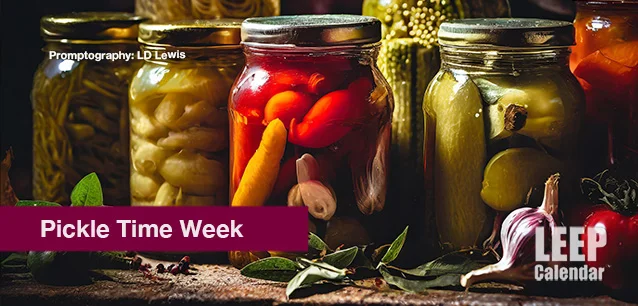 AD
AD
Country
- Africa
- Alcohol, Tobacco & Drugs
- Animals, Fish, Insects & Birds
- Anniversaries
- Australia
- Books
- Brazil & S.America
- Buddhism
Category
- Afghanistan, AF
- Aland Island, AX
- Albania, AL
- Algeria, DZ
- American, Samoa, AS
- Andarra, AD
- Angola, AO
- Anguilla, Al
Event Type
- Daily
- Weekly
- Annual
- Recurring
Duration
- All
- 1 Day
- 2 Day
- 3 Day
- 4 Day
- 5 Day
- 6 Day
Event Type
- Daily
- weekly
- Annual
- Recurring
Event Type
- Daily
- weekly
- Annual
- Recurring
Today is: May 04
Bike Day, Ride a, Ntl
Blessing of the Bikes
Candied Orange Peel Day
Chickens Day (Respect For), Intl.
Firefighters Day, Intl.
Five Boro Bike Tour (US-NY)
Greenery Day (JP)(1901)
Horace Mann Day (1796)
Infertility Survival Day, Ntl.
Mayday for Mutts, Ntl
Moon—First Quarter
Pug Crawl (UK)
Star Wars Day
Youth Day (CN)(1919)
Anxiety and Depression Awareness Week, Ntl.
Be Kind to Animals Week
Black Mothers Bailout Week
Children's Book Week
Children’s Mental Health Awareness Week (US/CA)
Computer, Choose Privacy Week
Deaf Awareness Week (UK)
Donkey Week (UK)
Drinking Water Week
Dying Matters Awareness Week (UK)
Emergency Preparedness Week, Ntl. (CA)
Facilities Managers Week, World FM
Family Week, Ntl
Galveston Historic Home Tour (US-TX)
Golden Week (JP)
Goodwill Industries Week (US/CA)
Heart Week (AU)
Hedgehog Awareness Week (UK)
Hug Holiday Week, Ntl.
Hurricane Preparedness Week, Ntl.
Maternal Mental Health Week
Mental Health Awareness Week (CA)
Motherless Daughters Awareness Week (AU)
Music Week, Ntl.
Neuropathy Awareness Week, Peripheral, Ntl.
Occupational Safety and Health Week, (US/CA/MX)
Pet Week, Ntl.
Physical Education and Sports Week, Ntl.
Privacy Awareness Week (AU/NZ)
Public Service Recognition Week
Puppy Mill Action Week
References Week, Update Your
Substitute Teacher Appreciation Week (SubWeek)
Summer Safety Week, Ntl.(CA)
Teachers Appreciation Week
Time for a Cuppa (UK)
Travel and Tourism Week, Ntl.
65 Roses Month (AU)
ALS Awareness Month
Amaranth Month
Arthritis Awareness Month, Ntl.
Asian and Pacific Islander American Heritage Month
Asparagus Month, Ntl.
Asthma and Allergy Awareness Month
Barbecue Month, Ntl.
Bike and Bicycle Safety Month
Blood Pressure Month, Ntl.
Borderline Personality Disorder Awareness Month
Brain Tumor Action Month
Building Safety Month, Ntl.
Cancer Research Month, Ntl.
Car-Keeping Month, Ntl. Good
Celiac Awareness Month (CA)
Cheese Month, American
Chocolate Custard Month
Civility Awareness Month, Global
Civility Awareness Month, Intl.
Civility Awareness Month, Intl.
Clap 4 Health Month
Coeliac Awareness Month (UK)
College Students with Disabilities Recognition Month
Condiment Month, Ntl.
Condiment Month, Ntl.
Craft and Design Month (2011)(UK)
Crohn's and Colitis Awareness Month (AU)
Cystic Fibrosis Month
Dhul-Qa'dah (M)
Digestive Diseases Awareness Month, Ntl.
Egg Month
Electrical Safety Month, Ntl.
Employee Health and Fitness Month, Global
Family Wellness Month
Fibromyalgia Education and Awareness Month
Food Allergy Action Month
Foster Care Month, Ntl.
Garden Month, Gifts from the
Gardening for Wildlife Month
Get Caught Reading Month
Haitian Heritage Month
Hamburger Month, Ntl.
Heal the Children Month
Healthy Vision Month (US)
Hearing and Speech Month, Better
Hemochromatosis Awareness Month (CA)
Hepatitis Awareness Month, Ntl.
Hereditary Hemochromatosis Genetic Screening and Awareness Month, Ntl.
High Blood Pressure Education Month, Ntl.
Huntington's Disease Awareness Month (CA)
Huntington's Disease Awareness Month
Inventors Month, Ntl.
Iyyar (J)
Jewish-American Heritage Month
Lung Cancer Awareness Month (AU)
Lupus Awareness Month, Ntl.
Lyme Disease Awareness Month
ME/CFS Awareness Month (US-CA)
Meat Free May (UK)
Medication Dependence Prevention Month (AU)
Meditation Month, Ntl.
Mediterranean Diet Month, Intl.
Mental Health Month, Ntl.
Microchip Your Pet Month (US)
Military Appreciation Month, Ntl.
Motorcycle Safety Month (US/CA), Ntl.
Mystery Month
Neurofibromatosis Awareness Month, Ntl.
Older Americans Month
Osteoporosis Prevention Month, Ntl. (US)
Our Lady of Peace and Good Voyage, Feast of (PH)
Pediatric Stroke Awareness Month, Ntl.
Pet Cancer Awareness Month, Ntl.
Pet Month, Ntl.
Photography Month, Ntl.
Physical Fitness and Sports Month, Ntl.
Physiotherapy Month, Ntl. (CA)
Posture Month
Preservation Month, Ntl.
REACT Month
Read to Your Baby Bump Month, Ntl.
Recommitment Month, Ntl.
Responsible Animal Guardian Month
Running of the Balls (US-TN)
Salad Month, Ntl.
Santacruzan, Flores de Mayo (PH)
Service Dog Eye Examination Month, Ntl.
Sexual Assault Awareness and Prevention Month, Ntl.
Skin Cancer Detection and Prevention Month
Sleep Month, Better
Spiritual Literacy Month
Stroke Awareness Month, Ntl. (US)
Stroke Month, Strike Out
Sweet Vidalia Onion Month, Ntl.
Tavern Month, Ntl.
Teen Self-Esteem Month, Ntl.
Thyroid Awareness Month (AU)
Tooth Month, Save Your
Toxic Encephalopathy and Chemical Injury Awareness Month, Ntl.
Trade Month, World
Triple Crown
Tuberous Sclerosis Awareness Month
Ultraviolet (UV) Awareness Month
Urgent Care Awareness Month, Ntl.
Vaisakh (S)
Vaisakh (S)
Vaisakha (H)
Victorious Woman Month Intl.
Vinegar Month
Vision Health Month (CA)
Walk in the Woods Month (UK)
Walking Month, Ntl. (US/UK)
Wetlands Month, American.
Women's Health Care Month, Ntl.
World Expo 2025 (JP)
Young Achiever's Month
Youth Services Month, Global
Youth Traffic Safety Month, Global
LEEP Calendar
Scroll to explore events active on this date.
Additional Events on LEEP
LEEP INK FEATURES

Events in April 2025
Spring has sprung in the north, and the first hints of Autumn are on the horizon in the south. April is the month spring (or fall) gets underway, and it is filled with religious celebrations, including the Mu...

Metamorphic March: Trends and events in March 2025
Welcome to Spring or Autumn. This is a transitional month with something for everyone. Internationally, it is Women's History Month, focusing on the achievements, needs, and challenges that women ...

February Favorites
The world steps into the second month of 2025 with hope and trepidation. The United States has a new administration. Canada is finding its way to a new administration. Germany and several other European nations...
About Pickle Time Week
Ends: Feb 17, 2024
DESCRIPTION:
Pickle Time Week was created in the mid-20th century by the Pickle Packers Association to promote the enjoyment of pickled foods during winter.
Pickling, an ancient culinary art, traces its roots back over 4,000 years. Originating in the fertile crescent of Mesopotamia, preserving food beyond its natural shelf life was primarily necessary. Pickling emerged as a practical solution to ensure a steady food supply across seasons and long voyages in an era without refrigeration.
The pickling process involves immersing foods in an acidic solution, typically vinegar, or through fermentation in a salt brine, creating an environment hostile to bacteria, thus preserving the food. The ancient Mesopotamians began by pickling cucumbers, and this practice quickly spread to other civilizations. The Egyptians, Greeks, and Romans not only adopted pickling for its practical benefits but also recognized its health advantages.
In the Middle Ages, pickling flourished in Europe as a standard method to preserve food, especially for sailors and explorers. The vitamin C in pickled vegetables helped prevent scurvy, a common ailment among sailors on long voyages. Moreover, the spice trade introduced new flavors into pickling, making it a preservation technique and a culinary art.
Fast forward to the modern era, pickling is no longer just a necessity but a beloved culinary tradition, celebrated for enhancing flavors and creating unique taste experiences. Pickled cucumbers, known as pickles in the United States, remain the most popular, but the practice extends far beyond cucumbers.
Today, many vegetables like beets, carrots, and onions are pickled, along with fruits such as apples, pears, and even watermelon rinds. Asian countries have unique pickling traditions, with kimchi in Korea, tsukemono in Japan, and achar in India, showcasing diverse pickled delicacies.
In summary, the history of pickling is a journey from necessity to gastronomic delight. It began as a vital preservation method and has evolved into a culinary craft cherished for its ability to transform and elevate the flavors of various foods.
VIDEOS
SUPPORTING DOCUMENTS
Currently, this event does not have supporting documents.
ADDITIONAL IMAGES
Currently, this event does not have supporting images.
Where would you like to go now?
 AD
AD
By using this site. You are agreeing to use of cookies. Learn more in our Privacy Policy
/footer-logo.svg)
LEGAL: Excerpts and links may be used, provided that full and clear attribution is given to Jubilee LLC and LEEPCalendar.com, with appropriate and specific direction to the original content (Page URL). Additional documents, embedded videos and additional image rights retained by their creators and are provided to increase understanding of the event or topic.
Jubilee LLC reserves the right to accept or reject inclusion of events in this calendar. The appearance of an event in LEEP Calendar does not imply endorsement of the event, nor the organization championing the event by Jubilee LLC, its stakeholders, customers or subsidiaries. All dates, contact information, URLs, addresses, and information relating to any event, promotion or holiday are subject to change without notice and should be treated as estimated. Jubilee LLC, our stakeholders, customers and subsidiaries cannot warrant accuracy. Users of this application are solely responsible for verifying actual event date with organizers and additional sources prior to committing resources, financial, human or otherwise.


